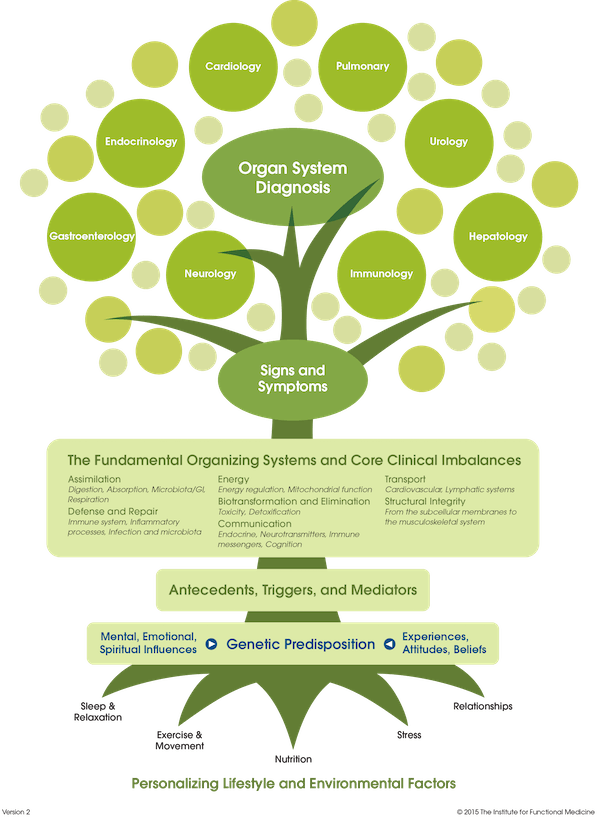What Is Functional Medicine?

Functional medicine is a personalized and integrative approach to healthcare which involves understanding the prevention, management and root causes of complex chronic disease, The ultimate goal is to heal disease and promote a healthy life. A healthy life is not defined as simply an absence of disease, but rather a positive vitality filled with energy, joy, gratitude and balance.
Functional medicine does not reject conventional medicine, instead it uses conventional medicine as a foundation on which to add new dimensions in the evaluation, management and prevention of chronic disease.
The foundational pillars of this healthcare approach are:
• Patient-centered care
By actually hearing the patient’s history, learning their story and then relating it back to them into the context of their problems, the physician brings the patient into the discovery process and develops a management plan that addresses the personalized needs of the patient.
• Integrative, science-based methodology
Using the latest evidence in medical research in conjunction with clinical expertise and patient preferences, the physician looks “upstream” into the complex web of interactions which can lead to illness from the patient’s genes, history, physiology and lifestyle. It is a true “inside-out” approach starting deep inside with the patient’s unique genetic makeup then outward to identify any physiological imbalances expressing themselves as complaints, symptoms and ultimately disease. Central to all this are the often overlooked aspects of internal factors (mind, body and spirit) and external factors (physical and social environment) which are vital in evaluating the individual for optimal function.
• Integrating best medical practices from multiple disciplines
If it works – use it. The functional medicine physician integrates traditional Western medical practices with other types of medical approaches from around the world. This integration of medical traditions is used to create the following emphasis:
- prevention of disease through nutrition, exercise and lifestyle.
- use of the latest laboratory testing and diagnostic techniques
- prescribed combinations of medications, botanicals, supplements,therapeutic diets, exercise plans, rehabilitation plans, detoxification programs and stress management techniques
Why Is Functional Medicine Needed?
Society is experiencing a dramatic rise in the amount of people suffering from complex, chronic diseases such as heart disease, cancer, diabetes, autoimmune disorders, ADHD, autism and mental illness. Healing the patient has become replaced with treating the patient. This change in terminology implies that the patient’s problems are permanent, but the symptoms may be controlled with a life-time of ever increasing drugs. Patients need an approach which embraces healing by addressing the root cause of their problems, rather than perpetually trimming the leaves of their symptoms. Functional medicine is that approach.

How Is Functional Medicine Different From Conventional Medicine?
 |
 |
| Functional Medicine | Conventional Medicine |
| Health-Oriented | Disease-Oriented |
| Patient-centered | Doctor-centered |
| Biochemical Individuality | Everyone is treated the same way |
| Most effective in dealing with chronic illness | Most effective in dealing with acute illness |
| Holistic | Specialized |
| Cost effective long term | Very expensive long term |
| Seeks root cause of disease | Diagnosis is based on symptoms |
| Primary prevention of disease | Early detection of disease |
Functional medicine is a personalized and integrative approach to healthcare that addresses the root causes of chronic disease rather than the prevailing conventional model of treating the symptoms. Functional medicine helps the patient attain true primary prevention of disease (before the disease is present) rather than just early detection (the disease process has already started). This is achieved by incorporating an analysis of how all the components of the human body interact functionally with one another and the environment. By focusing on a patient-centered approach, rather than the conventional disease-centered model, functional medicine addresses the whole person – not just their symptoms. In most cases, the patients possess the solutions to their own problems and the physician’s job is to retrieve that information and organize it into an actionable plan that the patient understands and is willing to do. Ultimately, functional medicine supports a uniquely personalized expression of health and vitality for each individual. This is an evolution in medical practice that better addresses 21st century healthcare needs.
Functional Medicine Approach to Assessment
Assessment focuses on the patient’s fundamental core clinical functions through an in-depth history, physical examination and laboratory testing. Multiple factors are considered:

• Core Clinical Functions: these are the fundamental physiological processes which keep all of us alive. All of the core clinical functions are influenced by environment, genes and mental state. When imbalanced, they can lead to symptoms and then disease. It is within these core clinical imbalances that the root cause for all chronic illness may be found. The seven core clinical functions are:
– Assimilation (digestion, absorption, microbiome)
– Defense & Repair (immune system and inflammation)
– Energy (energy regulation and mitochondrial function)
– Biotransformation & Elimination (toxicity and detoxification)
– Communication (hormones, neurotransmitters, immune messengers, cognition) – Transport (cardiovascular and lymphatic systems)
– Structural Integrity (from sub cellular membranes to musculoskeletal system)
• Environmental Inputs: some researchers have estimated that up to 80% of chronic disease risk is attributable to lifestyle. To address chronic disease you must address lifestyle. Some major modifiable lifestyle factors are:
– the quality of the water you use
– the quality of the air you breathe
– the quality of the food you eat
– the type of diet you follow
– your level of physical activity
– your amount and quality of sleep
– previous and ongoing exposure to toxins
– traumas you have experienced (physical, mental and emotional)
• Genetics: every person has a unique set of genes which may cause varying levels of susceptibility to disease. Although having a genetic blueprint on a patient is helpful in assessing disease, it is important to realize that your DNA is not your destiny. New research has shown that gene expression is influenced by many factors in the environment as well as the experiences, attitudes and beliefs of the patient. This is epigenetics. People can change the way their genes are activated and expressed through their actions.
More info: http://learn.genetics.utah.edu/content/epigenetics/intro/
• Mind-Body Elements: social, psychological and spiritual factors (particularly how the patient responds to stress in their life) can have an immense influence on health. Incorporating these elements are essential for a truly holistic approach to the patient.

Functional Medicine Approach to Treatment
The most important emphasis is placed on primary prevention of disease (before the disease process has begun). There is much wisdom in the old adage “an ounce of prevention is worth a pound of cure”. Once a disease process has started, a determination is made as to which core clinical function is imbalanced and responsible for causing it. Most functional imbalances can be addressed, some substantially improved (treated) and others completely returned to optimal function (healed). Rebalancing core clinical functions always has a significant positive impact on the health of the patient. A large toolbox of available interventions are evaluated and a customized treatment plan is applied for maximal impact on the underlying functionality.
Functional medicine expands the physician’s toolbox beyond pharmaceuticals and surgery. It also includes botanicals, supplements, therapeutic diets, exercise plans, functional neuro-rehabilitation, detoxification programs, stress management techniques and much more.
The physician and patient become active partners. Such a partnership allows the patient to truly be in control of improving their health and achieving optimal wellness.
Dr. Armen Nikogosian is a functional medicine doctor serving Las Vegas and Henderson, NV. For more information on available treatments go to SERVICES. You can also learn more about OUR APPROACH.






